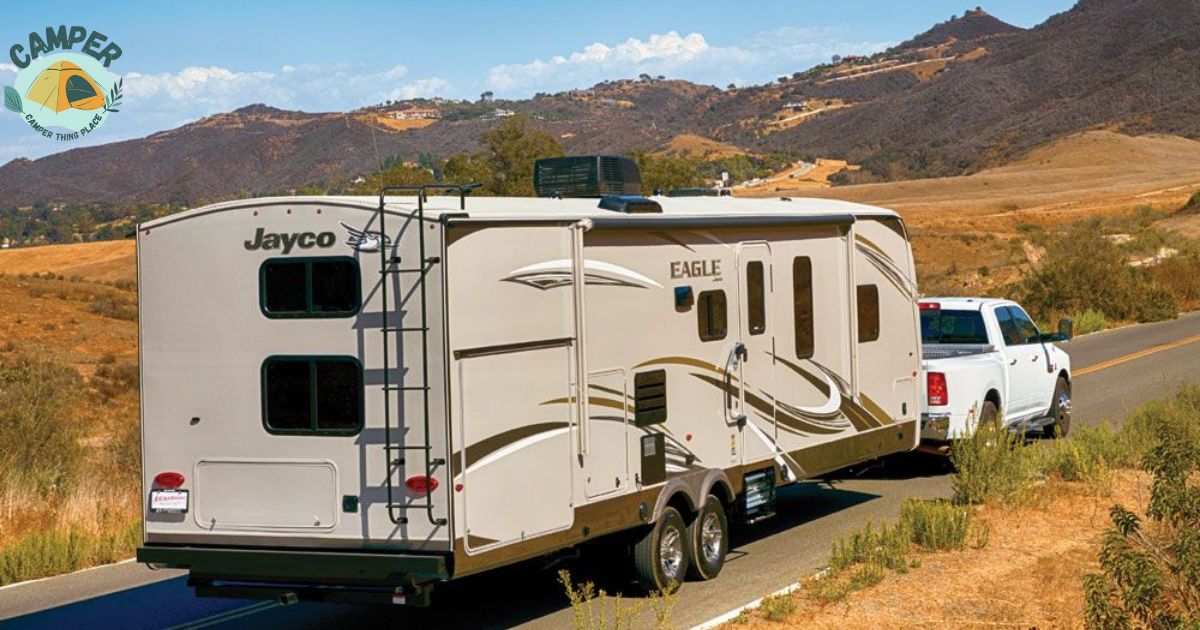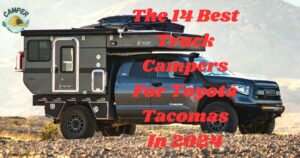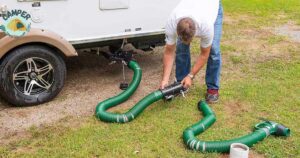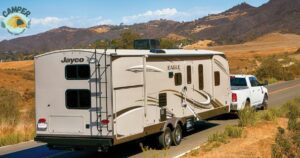A 5th Wheel Camper is a type of RV that hitches onto the bed of a pickup truck. It offers spacious living quarters with a raised section extending over the truck bed.
As you investigate further into the content, you’ll discover how to move a 5th wheel camper without a truck. Workings of each method and determine which one aligns best with your particular requirements when confronted with the task of maneuvering top-notch fifth-wheel trailers without a truck. Let’s explore these inventive solutions together!
This blog post explores different alternatives for effortlessly and efficiently relocating your non-motorized RV trailer. These options range from employing gooseneck adapters and trailer dollies to teaming up with fellow RV enthusiasts or opting for the services of professional towing experts.
What is a 5th wheel camper? A Brief Overview
A 5th Wheel Camper stands out in the world of recreational vehicles with its unique towing configuration. This type of camper connects to the bed of a pickup truck using a fifth-wheel coupling, ensuring stability and ease of towing.
The distinct advantage lies in the improved maneuverability on the road, thanks to the design that distributes the weight effectively over the truck’s rear axle. What sets the 5th Wheel Camper apart is its spacious interior.
Typically featuring multiple levels, these campers offer ample room for various amenities, including kitchens, bathrooms, and sleeping quarters.
The overhang extending over the truck bed not only adds to the overall living space but also contributes to a sense of separation and privacy within the camper.
Popular among those who prioritize comfort and convenience during their travels, 5th Wheel Campers have become a symbol of mobile living.
Whether for short getaways or extended road trips, their practical design and roomy interiors make them a preferred choice for adventurers seeking a home away from home.
Common Uses and Advantages of Owning a 5th Wheel Camper
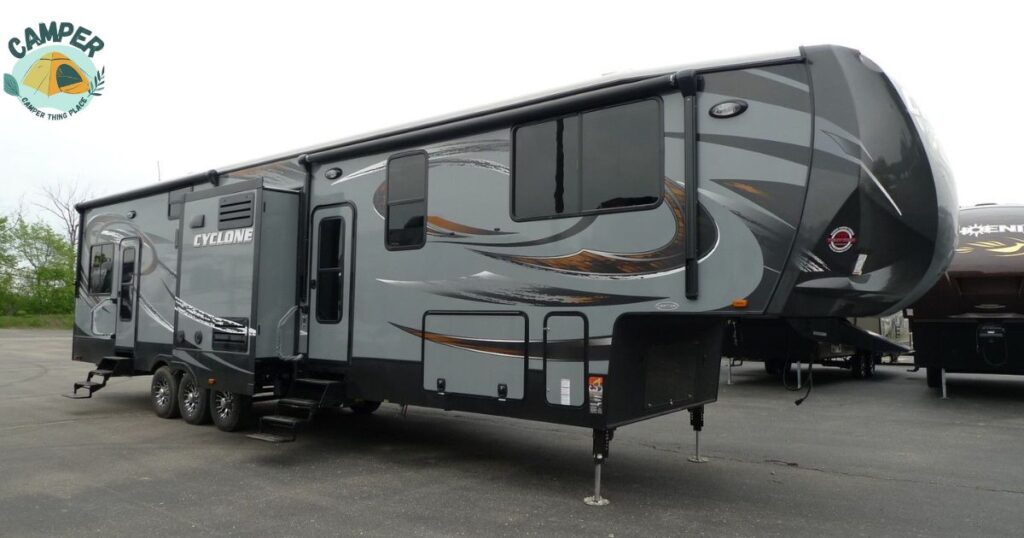
Owning a 5th Wheel Camper offers a range of benefits, making it a popular choice among RV enthusiasts. One common use is for recreational travel, where individuals or families can enjoy the freedom of the open road while having the convenience of a cozy and spacious living space.
Followings are the advantages of using 5th wheel camper:
Recreational Travel: Ideal for individuals or families exploring the open road with the comfort of a spacious living space.
Campground Comfort: Commonly used in campgrounds, providing a cozy environment for extended stays.
Enhanced Stability: A unique hitching system connects to the bed of a pickup truck, ensuring stable towing and smooth handling.
Spacious Interior: Multiple levels offer ample room for amenities like kitchens, bathrooms, and sleeping quarters.
Overhang Design: The overhang above the truck bed adds extra living space, creating a sense of home on the move.
Long-term Stays: Well-suited for extended periods, offering a level of comfort and convenience comparable to traditional homes.
Community Engagement: Popular in RV communities, fostering camaraderie among like-minded travelers in dedicated parks and campgrounds.
Versatility: Suitable for both weekend getaways and extended road trips, proving to be a flexible and enjoyable option for adventure seekers.
Can You Move a 5th Wheel Camper Without a Truck?
Moving a 5th Wheel Camper without a truck is generally not possible. Unlike conventional travel trailers that can be towed by various vehicles, 5th Wheel Campers require a specific setup. The unique hitching system, designed for connection to the bed of a pickup truck, ensures stability during towing.
Additionally, it’s important to consider the height of 5th Wheel Campers, as this factor plays a crucial role in safe and efficient towing. The design of the hitching system is tailored to distribute the weight over the truck’s rear axle, contributing to a smoother towing experience.
Without the proper hitching mechanism and the power of a compatible truck, attempting to move a 5th Wheel Camper would be impractical and unsafe.
The coupling system used by 5th Wheel Campers is not compatible with standard towing equipment found on other vehicles.
To transport a 5th Wheel Camper, you’ll need a suitable pickup truck equipped with the necessary hitching system.
It’s important to ensure that the truck’s towing capacity matches or exceeds the weight of the camper for a safe and smooth travel experience.
In short, it is possible to relocate a 5th wheel camper without a truck. Various commonly employed methods for achieving this are:
- Engaging a professional towing service
- Using a trailer dolly
- Renting a suitable vehicle
- Coordinating with fellow RV enthusiasts
Engaging a professional towing service
Engaging a professional towing service for your 5th Wheel Camper is a smart and stress-free solution. These services are equipped with specialized vehicles and experienced drivers who understand the unique requirements of towing larger trailers.
By opting for a professional towing service, you ensure that your 5th Wheel Camper is handled safely and securely. These professionals have the right equipment, including compatible hitches, to transport your camper without causing damage.
They also understand the weight distribution and towing limitations, ensuring a smooth and problem-free journey. The convenience of hiring a towing service extends beyond the actual transportation.
Professionals can assist in hooking up and disconnecting your camper, saving you time and effort. Moreover, they are well-versed in safety protocols, minimizing the risk of accidents or damage during the towing process.
When it comes to moving your 5th Wheel Camper, relying on a professional towing service is a reliable and efficient choice. It not only guarantees the safety of your camper but also allows you to focus on enjoying your travels without the logistical concerns of transportation.
Using a trailer dolly
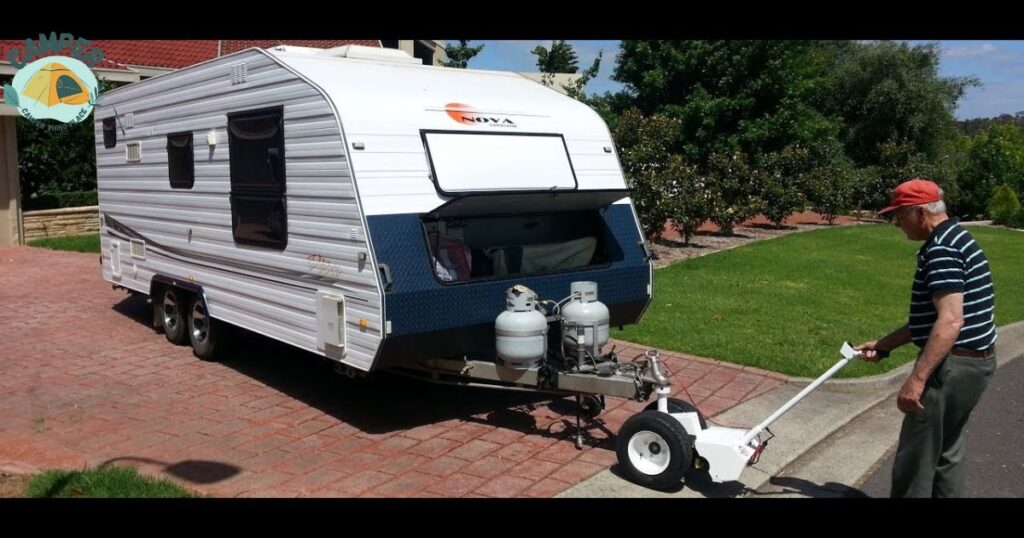
Using a trailer dolly can be a practical and efficient way to move your 5th Wheel Camper in certain situations. A trailer dolly is a small, hand-operated device designed to help maneuver trailers in tight spaces, such as driveways or storage areas.
Here’s a basic guide on using a trailer dolly for a 5th Wheel Camper:
Choose the Right Trailer Dolly: Ensure that the trailer dolly you select is appropriate for the weight and size of your 5th Wheel Camper. Different dollies have varying weight capacities, so check the specifications to ensure compatibility.
Attach the Dolly: Connect the trailer dolly to the front of your 5th Wheel Camper. This typically involves securing the dolly’s hitch onto the camper’s kingpin. Ensure a secure attachment to prevent any mishaps during movement.
Position the Dolly: Place the dolly in a central position underneath the kingpin. This will act as the pivot point for maneuvering the camper.
Operate the Dolly: Depending on the type of trailer dolly, you may need to use a handle or a lever to manually move the camper. Slowly and carefully guide the dolly to steer the camper in the desired direction.
Be Mindful of Terrain: Pay attention to the terrain and surface where you are using the trailer dolly. Smooth, level surfaces are ideal for easier maneuvering.
Safety First: Always prioritize safety. Ensure that the camper is securely attached to the dolly, and be cautious of your surroundings to avoid accidents.
While a trailer dolly can assist in short-distance movements, it’s essential to note that it may not be suitable for long distances or high-speed travel.
For longer journeys, especially on public roads, hiring a professional towing service with the appropriate equipment remains the safer and more practical choice.
Renting a suitable vehicle
Renting a suitable vehicle is an excellent option if you don’t own a truck capable of towing your 5th Wheel Camper. Follow these steps for a smooth rental experience:
Check Rental Options: Look for rental agencies that offer trucks or vehicles with the towing capacity needed for your 5th Wheel Camper. Confirm that the rental vehicle has a compatible hitch for your camper’s kingpin.
Verify Towing Capacity: Before finalizing your rental, confirm the towing capacity of the selected vehicle. Ensure it meets or exceeds the weight of your 5th Wheel Camper to guarantee a safe and efficient towing experience.
Reserve in Advance: To secure the right vehicle and avoid last-minute disappointments, make a reservation in advance. Provide details about your camper’s weight and dimensions to ensure the rental agency offers a suitable option.
Inspect the Rental Vehicle: Before accepting the rental vehicle, thoroughly inspect it for any damages or issues. Document any existing damage and report it to the rental agency to avoid being held responsible later.
Understand Rental Terms: Familiarize yourself with the rental terms and conditions, especially those related to towing. Check for any mileage restrictions, additional fees, or specific requirements for towing trailers.
Attach the Camper Safely: Once you have the rental vehicle, carefully attach your 5th Wheel Camper using the appropriate hitching mechanism. Ensure a secure connection, and double-check that all safety measures are in place.
Practice Towing: If you’re not accustomed to towing a camper, take some time to practice in an open and safe area before hitting the road. Get a feel for turning, braking, and maneuvering with the added weight.
Drive Cautiously: When towing your 5th Wheel Camper, drive cautiously and follow all road safety rules. Be mindful of the increased braking distance and take turns slowly.
Return the Rental Vehicle Promptly: Follow the rental agreement’s return conditions, returning the vehicle promptly and in the same condition in which you received it. Ensure you’ve complied with any specific guidelines related to towing.
Renting a suitable vehicle provides a practical solution, allowing you to enjoy your travels with your 5th Wheel Camper even if you don’t own a truck with the necessary towing capacity.
Coordinating with fellow RV enthusiasts
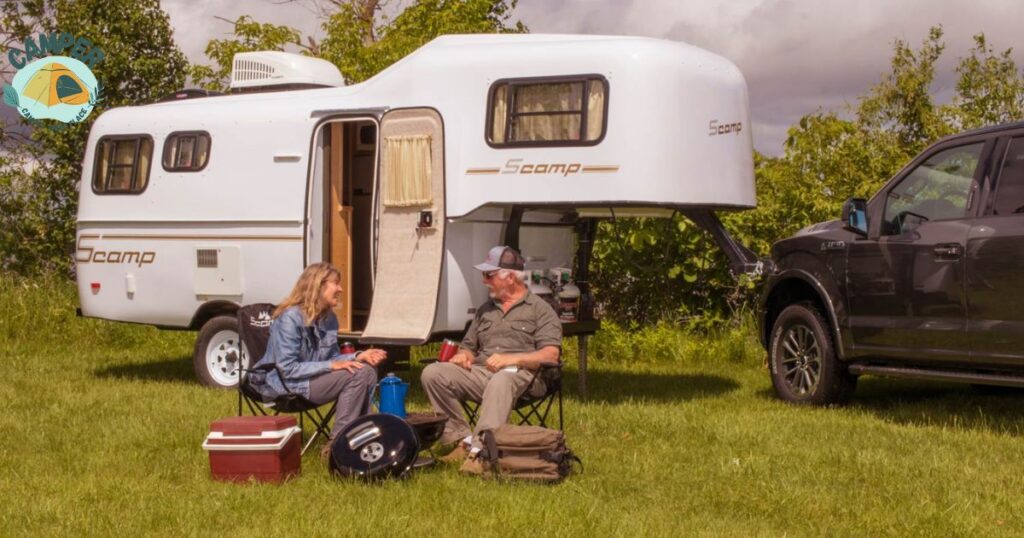
Coordinating with fellow RV enthusiasts can greatly enhance your overall experience on the road. Here’s how you can connect and collaborate with like-minded travelers:
Join Online Communities: Participate in online forums, social media groups, and RV-specific websites. Platforms like RV forums or dedicated Facebook groups provide a space to share experiences, ask questions, and coordinate meet-ups with other enthusiasts.
Attend RV Events and Gatherings: Keep an eye out for RV events, rallies, or gatherings in your area. These events provide an excellent opportunity to meet fellow RV enthusiasts, exchange travel stories, and even plan future trips together.
Utilize RV Club Memberships: Consider joining RV clubs or organizations that align with your interests. These clubs often host events, provide resources and facilitate connections with other RV enthusiasts.
Connect at Campgrounds: Strike up conversations with fellow campers at RV parks and campgrounds. Many travelers are open to sharing tips, and recommendations, and even forming impromptu travel groups.
Use Social Media Platforms: Leverage social media platforms to connect with RV enthusiasts. Instagram, for example, is a visual medium where you can share your travel photos and discover others with similar interests.
Coordinate Travel Plans: Discuss potential travel routes and destinations with fellow RVers. Coordinating travel plans can lead to joint adventures, shared experiences, and a sense of community on the road.
Share Resources: Exchange information on RV-friendly campgrounds, scenic routes, and must-visit attractions. Collaborative planning can enhance your trip and introduce you to places you might not have discovered on your own.
Organize Meet-ups: Propose or join meet-ups with fellow RV enthusiasts in specific locations. This could be a casual gathering for coffee, a potluck dinner at a campground, or a more organized event at a designated spot.
Create a Travel Blog or Vlog: Start a travel blog or vlog to document your RV adventures. This can attract like-minded individuals who follow your journey, and you may even find opportunities to connect in person with your audience.
Be Open to New Connections: Maintain an open and friendly attitude. RV enthusiasts come from diverse backgrounds, and being open to meeting new people can lead to valuable friendships and shared memories.
Coordinating with fellow RV enthusiasts not only adds a social dimension to your travels but also opens up avenues for shared experiences, helpful advice, and the possibility of creating lasting connections within the RV community.
Why Is It Hard To Pull A 5th Wheel Camper?
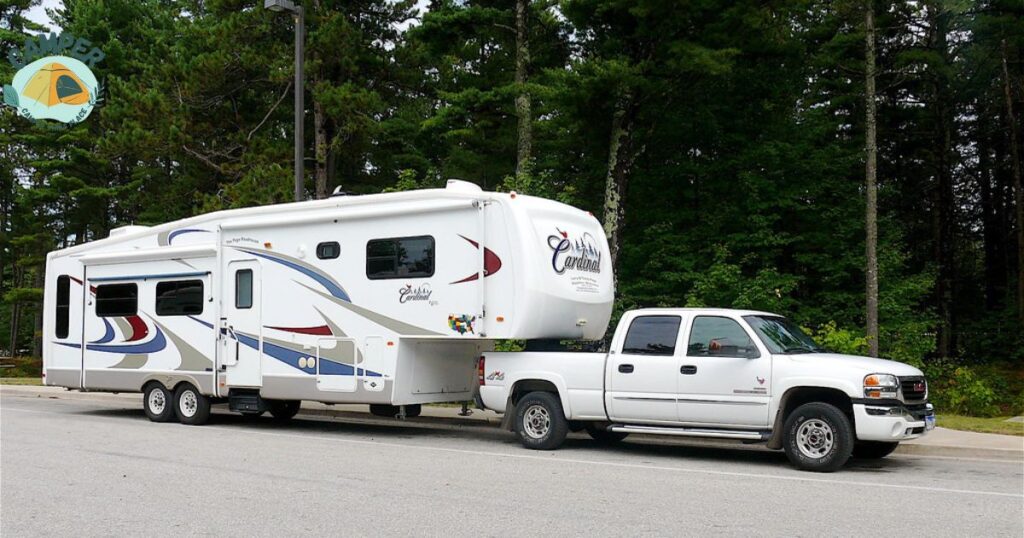
Pulling a 5th Wheel Camper can pose challenges due to several factors related to its design and towing setup. One primary reason is the overall size and weight of the camper.
5th Wheel Campers are often larger and heavier than traditional travel trailers, requiring a robust towing vehicle with sufficient power and towing capacity.
The unique hitching system of a 5th Wheel, which connects to the bed of a pickup truck, contributes to stability during towing but also adds complexity.
Maneuvering a 5th Wheel requires skill, especially when navigating tight turns or parking in confined spaces. The driver must be mindful of the extended length and unique turning radius of the combined truck and camper.
Additionally, the hitching mechanism itself demands precise alignment for a secure connection. This process can be more challenging than hitching a conventional trailer, and improper alignment may result in difficulty attaching or, in extreme cases, cause damage to the hitch or camper.
Despite these challenges, many enthusiasts appreciate the benefits of 5th Wheel Campers, such as spacious interiors and improved towing stability. With proper training and experience, pulling a 5th Wheel can become more manageable, allowing for enjoyable and safe travels on the open road.
Preparing for the Move
Getting ready for the move with your 5th Wheel Camper involves a few essential steps. First, ensure your pickup truck has the right hitching system for the camper’s unique design. Check the towing capacity of the truck to handle the weight of the camper.
Inspect and properly maintain both the truck and the camper before hitting the road. This includes checking tire pressure, and brake systems, and making sure all lights are functional. Secure all loose items inside the camper to prevent shifting during travel.
Plan your route, considering factors like road conditions and campground amenities. Make sure your travel documents and permits are in order. Before setting off, do a final walkaround to confirm everything is securely connected. With these preparations, you’ll be ready for a smooth and enjoyable journey with your 5th Wheel Camper.
Key Considerations Before Moving
Now that you’ve grasped the technique of moving a 5th wheel without a truck, let’s delve into the crucial steps to take before towing.
Regardless of the chosen method (assuming you’re handling the task yourself), these considerations should be at the forefront before embarking on your journey.
Check Gross Vehicle Weight Rating (GVWR)
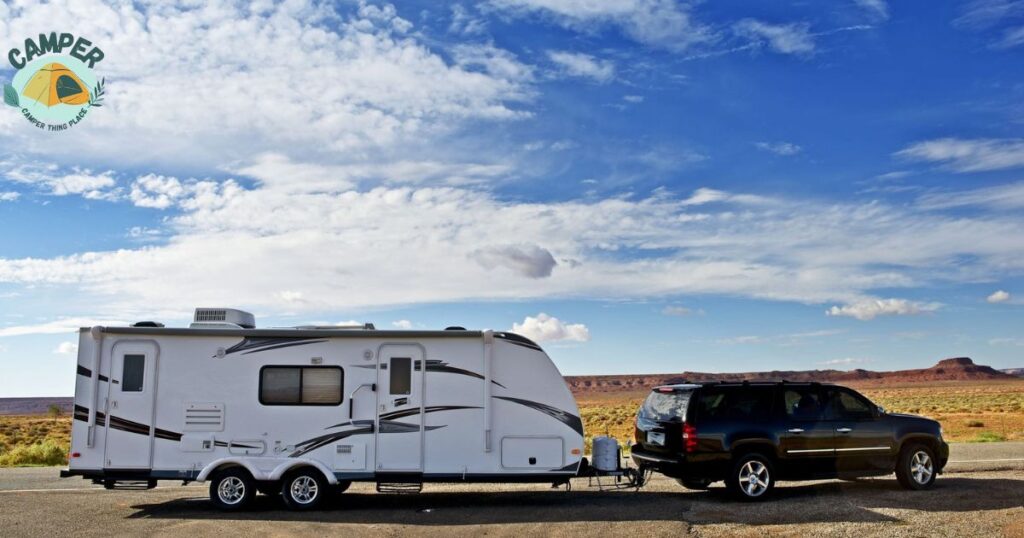
Before initiating the process, it is imperative to verify the Gross Vehicle Weight Rating (GVWR) to ensure that your vehicle can safely manage the load.
Understanding the GVWR of your 5th wheel camper is particularly vital when contemplating moving it without a truck. This information aids in determining the appropriate equipment or vehicle needed for a safe and legal move.
Exceeding the GVWR could lead to severe consequences, including damage to the towing equipment or potential accidents due to a loss of control.
Know Tow Capacity
Following the emphasis on checking GVWR, another indispensable factor is the tow capacity of the vehicle or equipment you plan to use. Knowing this figure is crucial for safe towing. Tow capacity denotes the maximum weight your vehicle or towing apparatus can handle safely.
Underestimating or guessing this number compromises safety and practicality. If the loaded 5th wheel surpasses the towing capacity, it may jeopardize control and stability during transit, elevating the risk of accidents.
Verify Hitch Setup
Ensuring the correct hitch setup is paramount when moving a 5th wheel without a truck. Different towing methods necessitate specific hitches or adapters. Compatibility between the equipment, fifth wheel hitch system, and the transporting vehicle is essential.
Using incompatible equipment may lead to ineffective towing or, worse, accidents caused by trailer detachment. Checking the hitch setup is not merely about avoiding inconveniences; it is fundamentally about guaranteeing safety.
Not all hitches are designed for hauling fifth-wheel campers, with some suitable for smaller trailers and others specifically crafted for larger ones.
Secure Everything
The final safety check before moving or towing a 5th wheel without a truck is ensuring that everything is securely fastened. This step varies based on your specific setup.
Thoroughly inspect all connection points, considering whether you would be comfortable with the security measures if your family members were nearby.
If any doubts arise, take the extra time to address them. Even compact 5th wheel campers carry substantial weight, making a meticulous approach imperative for safety..
Essential Precautions for Moving a 5th Wheel Camper
Moving a 5th Wheel requires careful precautions to ensure a safe and trouble-free journey. First and foremost, verify that your pickup truck has the correct and compatible hitching system for the 5th Wheel Camper.
This ensures a secure connection, preventing any mishaps during transit. Thoroughly inspect both the truck and the camper before hitting the road. Check tire conditions, and brake functionality, and ensure all lights are operational.
Pay special attention to the hitch and coupling mechanism to guarantee they are in excellent working order. Secure all loose items inside the camper to prevent shifting during transportation.
This not only protects your belongings but also contributes to stable towing. Double-check that all doors, windows, and storage compartments are properly closed and latched.
Plan your route carefully, taking into account road conditions, potential detours, and suitable campgrounds for stops. Be mindful of the camper’s height and length, especially when navigating through tunnels, bridges, or tight turns.
Finally, drive at a safe and moderate speed, especially considering the added weight and size of the 5th Wheel. Regularly check the camper in your mirrors while driving to ensure it is following smoothly. By taking these essential precautions, you can enjoy a secure and stress-free moving experience with your 5th Wheel Camper.
Frequently Asked Questions
What is a 5th wheel hitch?
It’s a hitch installed in the bed of a truck or on a tow vehicle designed to tow 5th wheel trailers.
What is a tow dolly?
A tow dolly is a small trailer that lifts the front wheels of the camper off the ground, allowing it to be towed by another vehicle.
Do I need a special license to tow a 5th wheel Camper?
It depends on your location, but in many places, a standard driver’s license is sufficient for towing a 5th wheel.
How do I connect the 5th wheel Camper to a tow dolly?
Secure the camper to the tow dolly using the appropriate straps and make sure it’s properly balanced.
What’s The Maximum Speed When Towing A 5th Wheel With A Tow Dolly?
Follow the manufacturer’s recommendations, but generally, it’s advisable to stay within 55-65
Are there weight limitations for towing with a tow dolly?
Yes, ensure that your tow vehicle and tow dolly can handle the combined weight of the 5th wheel.
Is it recommended to hire professionals to move a 5th wheel without a truck?
If you’re unsure or lack experience, hiring professionals is advisable to ensure a safe and proper move.
Final Thoughts
The process of moving a 5th wheel camper without a truck demands careful consideration and adherence to crucial steps. How to move a 5th wheel camper without a truck? Checking the Gross Vehicle Weight Rating (GVWR) ensures your vehicle can handle the load, preventing potential accidents or damage.
Confirming the towing capacity, verifying the hitch setup, and securing everything tightly are essential measures for a safe and successful move.
These simple yet critical precautions contribute to a smoother and worry-free experience when navigating a 5th wheel camper without the assistance of a truck.
Always prioritize safety and follow proper procedures to enjoy a trouble-free journey with your 5th wheel camper.

Jackson Ray, a seasoned blogger with a decade of experience, is the creative mind behind “camperthingsplace.com.” Explore his wealth of insights and passion for camping through engaging content on the website.
